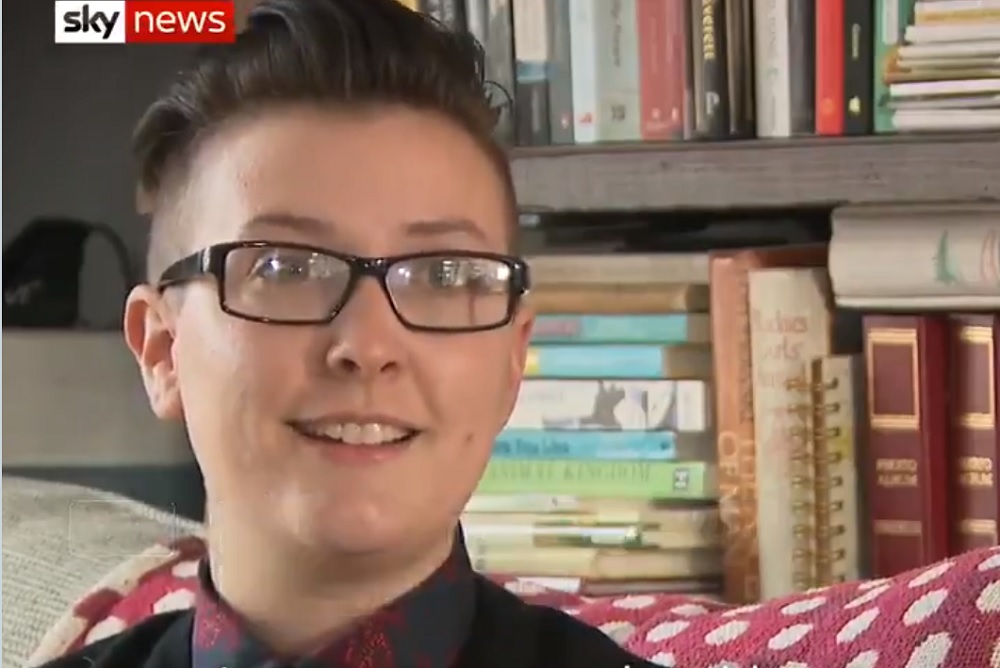At age 17, Charlie Evans lived as a boy, binding her chest and shaving her head. A decade later, in 2018, she publicly stopped being transgender. In the year since then, she’s been contacted by “hundreds” of transgender people looking to do the same, she recently told the United Kingdom’s Sky News.
The people contacting her “tend to be around their mid-20s, they’re mostly female and mostly same-sex attracted, and often autistic as well,” Evans said.
In the past decade, the United Kingdom has seen a 4,500 percent increase (not a typo) in girls identifying as transgender. Brown University last year tried to repress the first major study looking into “rapid onset gender dysphoria” as a social contagion that seems to especially affect girls.
After a recent public talk, Evans says, a young woman with a beard approached her, saying she was also working to return to living as her birth sex. This young woman “said she felt shunned by the LGBT community for being a traitor,” Evans said. “So I felt I had to do something.”
'Hundreds' of young trans people seeking help to return to original sex.
Charlie Evans, who has detransitioned, tells Sky News she has been contacted by hundreds of people seeking advice.
You can find the full story here: https://t.co/qhxV4uQnZj pic.twitter.com/XcpGyZf9l9
— Sky News (@SkyNews) October 5, 2019
Evans is starting a U.K. charity, the Detransition Advocacy Network, to offer support to people like Ruby, another young woman Sky News interviewed for its story on growing numbers of former transsexuals. Of her decision to stop being transgender after eight years of taking cross-sex hormones, Ruby says, “I didn’t feel like there was any support out there, other than like a few friends online.”
"I didn't feel that there was any support out there"
'Ruby' began to identify as male age 13, but now, 21, she has decided to stop taking testosterone and detransition.
Read the full story here: https://t.co/iEsF6R8XeY pic.twitter.com/KWpsEvpZGc
— Sky News (@SkyNews) October 6, 2019
“For everyone who has gender dysphoria, whether they are trans or not, I want there to be more options for us because I think there is a system of saying, ‘Okay here’s your hormones, here’s your surgery, off you go’. I don’t think that’s helpful for anyone,” Ruby told Sky News, a division of Comcast.
A nearby National Health Service location that specializes in transgender medicine “now ha[s] a record number of referrals and see 3,200% more patients than they did 10 years ago – with the increase for girls up by 5,337%,” Sky News reports. They see patients as young as age three for transgender treatments.
This sudden and explosive growth in transgender identification has happened in both the United Kingdom and United States. As Renee Gardner notes, “The first gender clinic in the United States opened in 2007 in Boston. An October 2016 article states there are now more than 60.” The state of Oregon now offers taxpayer-paid sex-change surgeries to children as young as 15 with no parental notification, and Oregon “health providers are immune from liability for acting against parents’ objections ‘in good faith.'”
A U.S. researcher recently did a study that confirmed at least two 13-year-old girls and five 14-year-old girls have been given double mastectomies as a result of identifying as transgender. Yet a recent review of the research available on this topic found that “Only a minority of children who experience cross-gender identification will continue to do so into adolescence or adulthood.”
With the growth in transgenderism, once an extremely rare phenomenon, has also come a growth in formerly transgender people. Nine such individuals just filed a brief with the U.S. Supreme Court in a case that will decide whether employers must allow transgender people to live as the opposite sex while on the job. The Supreme Court hears oral arguments in that case Tuesday.
“Almost every single person in the brief said they stopped being transgender with the help of therapy,” writes Nicole Russell in a review of the Supreme Court brief from formerly transgender people. “It didn’t just help them heal, but also revealed that deeper emotional traumas were often the cause of their gender dysphoria and the reason they chose transgenderism in the first place. All of the people claim that those who proposed or helped them transition often (unknowingly) created more pain.”
People looking for help in returning to a life that affirms their biological sex can find resources at SexChangeRegret.com, the website of Federalist contributor Walt Heyer, another former transgender person.



